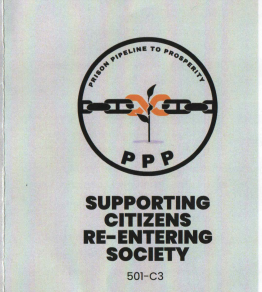
Leading the Fight Against Recidivism by Empowering Ex-Offenders
CAMDEN, NJ In a society often quick to judge, Jamaal Brown’s story serves as a powerful testament to the resilience of the human spirit and the potential for transformative change. From his roots in Camden, New Jersey, Jamaal’s journey has been marked by adversity, including nearly 15 years spent within the confines of the New Jersey Department of Corrections. However, rather than succumbing to the challenges of reintegration, Jamaal emerged with a steadfast determination to rewrite the narrative for himself and others like him. As the CEO and founder of the Prison Pipeline to Prosperity foundation, Jamaal’s mission is clear: to provide a lifeline of opportunity and empowerment for those reentering society post-incarceration.
In an exclusive interview with the nation’s premier faith-based and professional newspaper for winners, Anointed News Journal, Jamaal explains how he seeks not only to address the systemic barriers to employment, but also how he plans to foster a broader movement of advocacy and reform.
Collins:
Who is Jamaal A. Brown?
Brown:
Jamaal Brown is a resident of Camden, New Jersey, born and raised in the city. I attended Forest Hill Elementary School and Hatch Middle School in Camden, New Jersey. I a father of four and a grandfather of four. I am self-employed.
Collins:
And you’re also the CEO and Founder of PPP Prison Pipeline to Prosperity. Tell us, first of all, what motivated you to start this nonprofit and what is the mission?
Brown:
My motivation for the nonprofit stems from my own experience. Unfortunately, I spent 15 years in the New Jersey Department of Corrections. After returning home, I encountered numerous obstacles in securing stable employment that could sustain a decent way of life. These challenges often lead individuals to revert to behaviors that led to incarceration in the first place. The mission of the nonprofit, Prison Pipeline to Prosperity, is to establish a system where citizens reentering society have opportunities for decent employment upon release from prison, providing them with a game plan to navigate life post-incarceration, especially concerning financial responsibilities like supporting dependents. The pressure faced by those returning from incarceration is immense, and our goal is to alleviate some of that pressure through meaningful employment opportunities.
Collins:
Your organization is a registered 501(c)(3). How important is it for returning citizens to have a support system such as what you provide?
Brown:
It’s incredibly important, especially considering the circumstances many of us face, where systemic factors such as the education system and community environments contribute to a pipeline to prison. We aim to counter this trend by offering support and resources to empower individuals to rebuild their lives after incarceration.

Collins:
Let’s talk about some of your partners and why it’s necessary to refer people to other agencies.
Brown:
Yes, the plan is to get involved with other nonprofits based in the city. OEO, for example, Volunteers of America, and the Center for Family Services. I want to partner up with every nonprofit that’s helping the community in some way, shape, or form. And to my knowledge, there’s really not a program specifically catered towards those in that position. So I want to provide that. So guys returning home can have a place where they can go and do job research and so forth. Also, I plan on having minority companies registered with the pipeline. So when individuals research the pipeline, they could see certain jobs or companies that are willing to give them an opportunity. And we know that many agencies like Volunteers of America, Camden County OEO, and the Center for Family Services have resources to help ex-offenders.
Collins:
Whether it’s job readiness training or benefits for additional training offered by the Department of Labor, individuals have the opportunity to improve their skills and make themselves more marketable for employment. There are also incentives that the state offers to employers who hire ex-offenders. Running a nonprofit also requires funding. How are you funded, and are you open to receiving donations to help run your program?
Brown:
Yes, I’m definitely always open to receiving help wherever it may come from. As of now, I fund everything through my for-profit company, L & C Alliance Company, which specializes in landscaping, cleaning, and floor care. The revenue I receive from that goes towards the nonprofit.
Collins:
You mentioned you’re open to other agencies or nonprofits reaching out to partner with you, such as VOA and Camden County OEO. Tell us about your for-profit company, where you take the lead in hiring ex-offenders and providing work opportunities for them.
Brown:
Sure. The name of the company is L & C Alliance Company, which stands for Landscaping and Cleaning Alliance. We specialize in floor care services such as carpet extraction, stripping and waxing vinyl floors, as well as window cleaning, pressure washing, and daily housekeeping.
Collins:
And how can people contact you to acquire your services?
Brown:
I can be reached at (856) 349-2525 or by email at [email protected].
Collins:
You’ve also taken the initiative and motivated many of your employees to get involved in the Camden community. You’ve participated in the mayor’s cleanups. What was that experience like for you as the leader and for some of your employees?

Brown:
That experience was very humbling. Just knowing that bringing the community together in that way, as great or small as it may have been, was impactful. I wasn’t able to have as many people there as I would have liked, but bringing civilians back into society, working together with the mayor’s office to clean and ensure the community’s safety was very humbling. I appreciated the mayor offering us the opportunity to come out every week.
Collins:
You have a lot of experience in many different things. You spoke about some of the struggles that one might go through in school and growing up in the urban community. What words of encouragement would you give to a young man or woman when it comes to pursuing their dreams or staying focused to accomplish their goals?
Brown:
The one piece of advice that I would give is to keep your goal in mind. Regardless of how far away it may seem, it’s always a step-by-step process. Even though it may seem like there are many small steps to take, as long as you stay on that path, you’ll get there. It’s important to avoid distractions that can veer you off course.
Collins:
You talked about some of the roadblocks that individuals face when they come home from incarceration, particularly concerning employment opportunities. You’ve also discussed entrepreneurship and how you were able to establish your company and provide opportunities for individuals. How does it feel to overcome those challenges and start your own business? How does it feel to become an entrepreneur and give back?
Brown:
I feel worthy to myself and my family, but I also feel humbled. I know that many others have been in my shoes and have paved the way through example for me to learn from. But what’s even more significant than doing it myself is putting myself in a position to help others who may not have had the same opportunities to learn. It’s about making others aware that they can achieve similar things.
Collins:
So, what’s next for Jamaal Brown?
Brown:
What’s next for me? As far as I can see right now, is the nonprofit foundation, Prison Pipeline to Prosperity. Although it’s based in Camden, I eventually want to take it to other counties like Newark, New Jersey, Trenton, and other states as well. I want to try to make this into a movement that can spread across the entire country, like a national model.
Collins:
Some of the services that you offer as part of your curriculum are what?

Brown:
1. Empowered Lives: A world where individuals emerging from the criminal justice system are empowered with the tools. guidance, and opportunities to rebuild their lives with dignity and purpose
- Community Transformation: Communities where the stigma associated with past incarceration is replaced by a spirit of understanding, acceptance, and collaboration, fostering an environment where everyone has the chance to contribute positively.
- Lasting Change: A sustainable shift in the narrative of re-entry with systemic changes that address the root causes of incarceration, leading to reduced recidivism and a more just and equitable society.
- Inclusive Collaboration: Partnerships and collaborations among individuals, businesses, and communities that transcend barriers creating a seamless pathway for those transitioning from prison to prosperity.
- Advocacy for Reform: A commitment to advocating for criminal justice reforms that emphasize rehabilitation reintegration, and equitable opportunities, ensuring that the prison pipeline is dismantled at its core.
- Inspiration for Others: A source of inspiration for individuals, organizations, and communities worldwide to join the movement, recognizing the potential for positive change in the lives of those who seek redemption.
One of my personal experiences that made me really face the barriers of coming home from incarceration was when I personally served 13 years and nine months. I lost trial for sexual assault, which, as relevant or irrelevant as it may be, put multiple barriers in trying to get my life together and back on track. That’s honestly one of the reasons why I became self-employed. Obtaining decent employment is very hard due to the screening process, although necessary, because there are situations where you can hire the wrong person. Understanding that the screening process is necessary, it’s still somewhat of a demeaning experience that everyone has to go through. But having other options and opportunities to invest in myself brought me to become self-employed and create and come up with a cleaning company.
Collins:
And we certainly appreciate you sharing that information and your journey. When it comes to many people coming out of incarceration, there often exists a stereotype. However, as you mentioned, systemic racism or injustice means not everybody incarcerated is guilty. Many find themselves in situations where they take plea agreements, doing what they feel is best for them at the time. So, thank you for sharing.
The Anointed News Journal reaches over 180,000 readers weekly. In conclusion, what would you like to say to the readers of The Anointed News Journal?
Brown:
I just want to express my gratitude for taking the time to learn about what I’m trying to accomplish with the Prison Pipeline to Prosperity foundation. We’re open to anyone who believes in reducing the recidivism rate and would like to support our cause. May God be with us all.
Collins:
And again, they can reach out to you.
Brown:
Certainly. My contact information for the nonprofit foundation is [email protected], and for the cleaning company, it’s [email protected]. You can also reach the business at (856) 349-2525, or my cell phone at (856) 261-9762.
Jamaal Brown’s journey from incarceration to entrepreneurship exemplifies the power of perseverance and the potential for redemption. Through his nonprofit, the Prison Pipeline to Prosperity foundation, Jamaal has dedicated himself to breaking down barriers and providing second chances for individuals reentering society after incarceration. As he expands his efforts beyond Camden, Jamaal’s vision of a nationwide movement for prison reform offers hope for a more just and equitable future for all.
“Our vision is not just a distant goal; it’s a guiding light that propels us forward in our mission to break the cycle of incarceration and pave the way for a future where everyone has the chance to thrive. Together we envision a society where the pipeline to prosperity replaces the path of imprisonment creating a legacy of hope and transformation for generations to come.” ~Jamaal A. Brown
By Chris Collins

Recent Comments